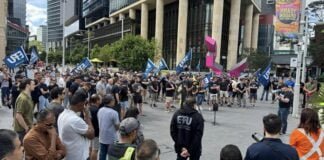Howard’s long gone – so why are uni managements still acting like Liberals?
Labor was elected amid talk of an education revolution. But uni managements continue to act as if nothing has changed. Almost a year after most of us lodged our Collective Agreement claims, we are still being strung along with talks about talks.
It’s crystal clear that spending on capital works is being given priority over meeting the needs of staff. And if workload issues are not dealt with, students will be the losers, too.
Management claims that they have had to wait for the federal budget, and now their own budget planning process, before engaging in meaningful talks. They say that the economic crisis is also cramping them.
Yet Sydney Uni – a university that lost $114 million in investment income last year – has conceded what is effectively 18 per cent over three years, with significant improvements in terms of restrictions on use of casuals.
It would cost unis next to nothing to eradicate the HEWRRS, the restrictions on union rights which the Liberals imposed as a condition of funding. Yet management is no more willing to talk on these issues than on pay.
There is a problem with higher education funding. Labor has promised to raise the proportion of public funding, especially for research. But this “revolution” isn’t only half-hearted; the extra bucks will not arrive for several years.
This is a reason for the union movement to take Labor to task over unmet promises. But it’s not a reason for us to hold back on our claims.
Student numbers, including international recruitment, are booming. Income is rising as a result. RMIT, for example, has recorded a combined surplus of $164 million over the past three years.
NTEU members did not cause the global recession. We are not responsible for higher education being starved of public funding. On the contrary, it’s our goodwill and, too often, our unpaid overtime that has helped unis survive and succeed.
Sydney Uni settled because it feared solid, determined industrial action. The lesson is that today must be only the start of whatever action it takes to bring managements to heel.
The NTEU committee at RMIT has discussed a two-day stoppage on 4 and 5 June, in the run-up to the holiday weekend. It’s an excellent idea.
If today’s action doesn’t bring results, we should all be out together again.
nteu-strike-leaflet





